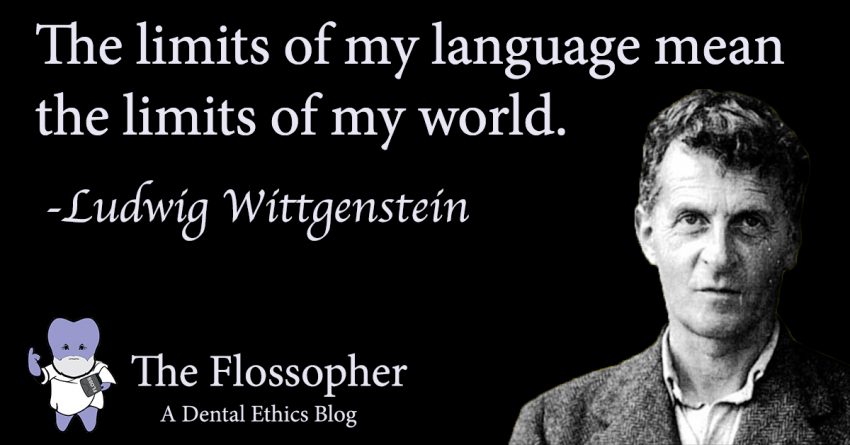Philosophy of language is the third tripartite in the hierarchical foundations of philosophy. Every philosophical subject (ethics, religion, etc.) can be expressed as a “what is…?” question, “how do we know what is…?”, or a “how to express our knowledge of what…?”. Mindfulness of language selection is important in dentistry when it comes to dealing with children, management of anxiety, and proper informed consent. This article will explore the ethical conflicts in each of these areas when it comes to language selection in the dental field.
Sugar Bugs
Dental professionals try to make dentistry fun for children. While caries remains the most common chronic condition in children, we want to develop a habit in children to see the dentist at least every six months so they are getting the much needed care. Often language control makes dental conditions relatable to kids and districts kids from developing bad associations during traumatic procedures.
I treat children like adults. They need to know what is going on because humans fear what they do not know. Dental professionals have to explain to kids what they are doing to get the child on their side. Even though consent legally is determined by the caregiver, it is practical to have a cooperative child and to have a mutual understanding that the dental caregiver is on his or her side. Children relate to words like “sugar bugs” as a substitution to “caries” (the disease process that creates cavities in teeth) because bugs are gross and a dental dam being called a “rain coats” helps them to understand that it prevents water and chemicals from being swallowed.

Do you want a shot? I’m guessing not if you really have to. When you tell a child that I’m placing “sleepy juice” next to the tooth to put the tooth to sleep so it doesn’t tickle too much while we work on the tooth the child is more cooperative. If the high speed drill is “Mr. Whistle” they don’t see the high pitch noise as a bad thing. Children get used to the routine of getting their teeth “tickled” and trust between the dental professional and the patient flourishes throughout adulthood.
Sensitivity Training
The same technique of word substitution can be comforting with adult dental treatment. We might not want to use the term “sugar bugs” but “Streptococcus mutans” (the bacteria involved in caries) might not be useful in simplifying to patient common dental diseases. People have different educational backgrounds and cultural upbringings. It is important to understand where a patient is at and use language and concepts they can best understand. You might be dealing with a professor that really is interested in the disease mechanism and her best options to reduce her caries risk but you might also be dealing with an 80 year that has never been to the dentist. Everyone is different in their level of medical and dental exposure. It is important to be sensitivity to a patient’s background and communicate accordingly.

Being mindful of how dental professional communicate with patients involves getting to know a patient’s background. It is a holistic approach to dental treatment that allows for patients to be more aware of dental treatment and more trusting of the treatment plans.
Language Selection in Informed Consent
There are many dental procedures that patients would benefit from but they are often scared based on images from the internet or what they have previously heard. They have horrible ideas of what may happen even when most often a dental appointment is boring and there is only a little soreness after the procedure. Dental professionals have to understand that patients do not visually process an event from the dentist’s perspective. Decisions are usually made quickly based on how the dentist explains a procedure. Mentioning the word “surgery” can often scare a patient even though most dental procedures are technically surgical. A patient needs to know the risks and benefits of a procedure and what they may experience during a procedure but getting into all the scalpels and blood will bias patients as they make decisions based on fear not a rational deliberative process focused on improving oral health.

Controlling language is not exploitative or misleading because the intention is to better facilitate autonomous decision making instead of emotional kinds. A Kantian may claim that with holding words commits a contradiction of will since it holds access to certain words and limits it to the will of others. It is important to understand that the contradiction of will is only legitimate if the patient cannot make an informed decision (missing information). We want to select words that do not trigger emotions but inform the patient of risks/benefits and possible experiences during and after a procedure. Autonomous judgements are made from clear concepts, not muddling words.
A Kantian may also claim that a contradiction of thought is at least committed since the practice of word selection does not account for a patient’s emotions. Desires and fears direct autonomous acts and motivate the will to action. This objection is not legitimate because a dentist in word selection explains the benefits/risks of a dental procedure clearly so a patient still has content for her will. The patient doesn’t operate on fear but operates on the value (joy or happiness) that the dental treatment brings. The intention behind word selection is not to influence a patients emotional preferences but help them to make an autonomous decision on their personal oral health when they seek their own happiness or well-being.
Significance
Comforting bedside manner involves consistent and selective word choice with patients. The intention is not to trick patients but understand that language has a great deal of power over how a dental appointment is experienced. Patients feel the pull of the mouth mirror and listen to what the dentist tells telling them how the procedure is going; patients are usually not able to appreciate visually what a dental surgery involves.
Language is very important with children in establishing good memories and developing trust. Word selection is sometimes key to helping a patient make an informed decision based on value evaluation rather then fear. Promoting autonomous decision making in dental treatment relies on a philosophical understanding of language selection.
Author
Dr. Vishnu Burla, DDS, BA Philosophy
Further Reading
See Intro to Dental Ethics for an explanation of Kantian ethics and the other two major ethical theories: Utilitarianism and Virtue ethics. Try to find other ethical concerns from the perspective of these ethical theories when it comes to language selection in dentistry.
See Mindfulness for an introduction to the philosophical foundations of mindful thinking and its importance.
See Internet Encyclopedia of Philosophy for an Intro to Philosophy of Language.

Facebook Comments